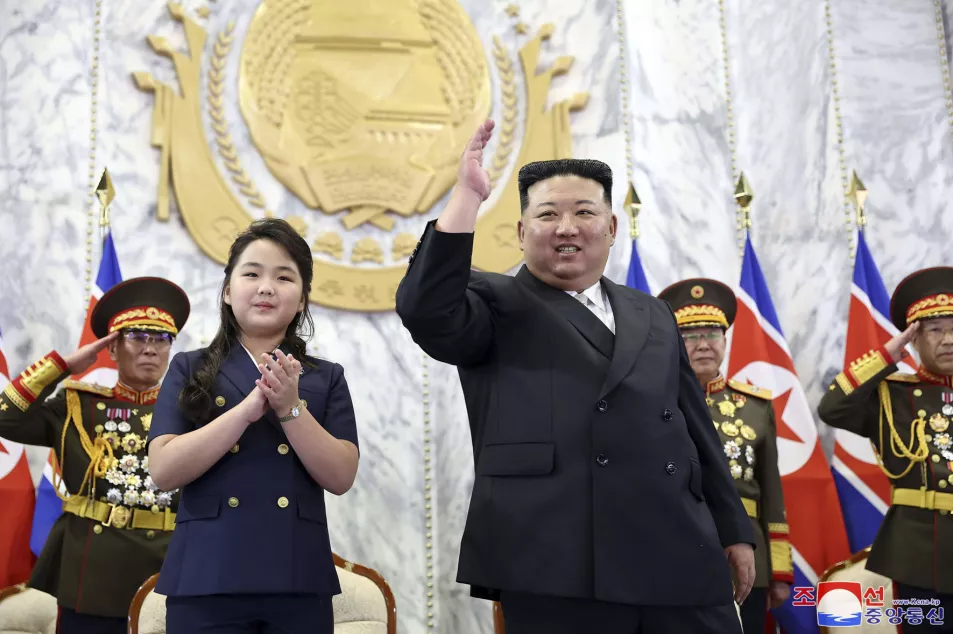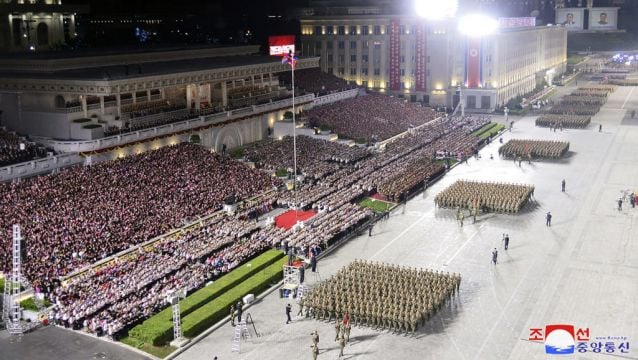North Korea invited visiting Chinese delegates and Russian artists to a paramilitary parade to celebrate the 75th founding anniversary of the state on Saturday.
It was part of leader Kim Jong Un’s latest effort to display his ties with Moscow and Beijing in the face of deepening confrontations with Washington, analysts said.
The event in the capital, Pyongyang, which began on Friday night, came amid expectations Mr Kim will travel to Russia soon for a meeting with President Vladimir Putin that could focus on North Korean arm sales to refill reserves drained by the Kremlin’s war on Ukraine.
While China has sent a delegation led by vice premier Liu Guozhong to the anniversary celebrations, Russia sent a military song and dance group.
South Korean media speculated the lack of Russian government officials at the festivities could be related to preparations for a summit between Mr Kim and Mr Putin, which Washington expects within the month.

Mr Putin is expected to attend an international forum that runs from Sunday to Wednesday in the eastern city of Vladivostok, which was also the site of his first summit with Mr Kim in 2019 and is now seen as a possible venue for their next meeting.
South Korea’s spy agency told lawmakers in a closed-door briefing on Thursday that North Korea and Russia could also be arranging an unexpected “surprise” route for Mr Kim’s visit to avoid potential venues reported by the media.
North Korea has not confirmed any plans for Mr Kim to visit Russia.
Leif-Eric Easley, a professor at Ewha University in Seoul, said: “Whether or not a Putin-Kim summit soon follows, the United States is attempting to deter serious violations of international law by pre-emptively releasing intelligence.”
The growing co-operation between China, Russia and North Korea, and Chinese President Xi Jinping’s decision to skip the G20 summit in India, gives the appearance of a widening fissure in Asia’s geopolitical landscape, he said.
Still, a major Russia-North Korea arms deal, which would breach numerous international sanctions, should worry Beijing because “association with an emerging pariah state bloc could have negative repercussions for China’s globalised but struggling economy”, Mr Easley said.

KCNA said Mr Kim received letters from Mr Putin and Mr Xi on the anniversary, where both leaders said their countries’ strengthening ties with North Korea would contribute to the region’s peace and stability.
Saturday’s parade was centred around paramilitary organisations and public security forces protecting Pyongyang, rather than the military units that handle his nuclear-capable weapons systems, which have been the focus of other parades this year.
Millions of North Koreans between the ages of 17 and 60 are listed as Worker-Peasant Red Guards, a national civil defence organisation that could be loosely compared to military reserve forces of other countries.
Saturday’s marches of the Red Guards included huge columns of motorcycles, anti-tank rockets towed by tractors and civilian-style trucks equipped with multiple rocket launchers, according to KCNA’s text reports and photos.
Photos showed Mr Kim smiling and talking with his young daughter, believed to be named Ju Ae, as they watched the parade from leather chairs set up at his balcony in Kim Il Sung Square named after his state-founding grandfather.
KCNA said Mr Kim met with Mr Liu and other Chinese delegates ahead of the parade, where they exchanged views on “further intensifying the multi-faceted co-ordination and co-operation” between the countries.







